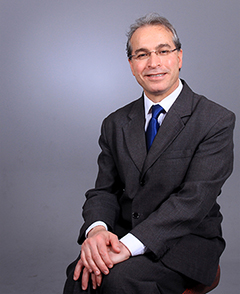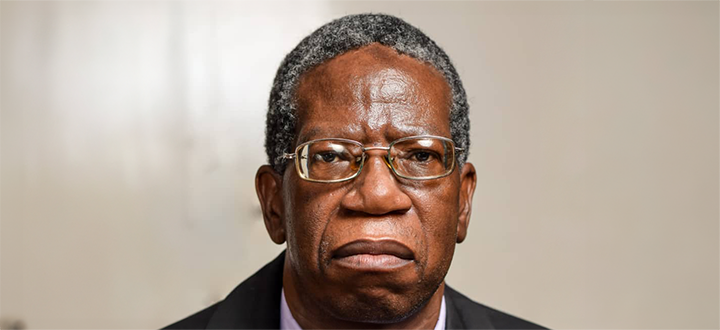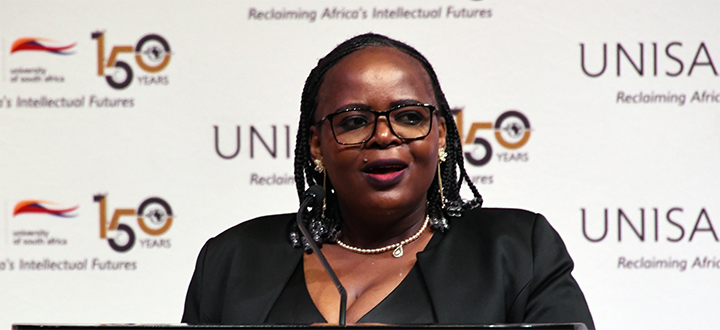College of College of Graduate Studies
Unisan adds 'Science Oscar' to his achievements in 2018

Prof Malik Maaza
- Unesco-Unisa Africa Chair in Nanosciences and Nanotechnology
- Africa & International Relations Manager, iThemba LABS-NRF
- Fellow: African Academy of Sciences
- Fellow: European Academy of Sciences
- Fellow: Royal Society of Chemistry, London
- Fellow: New York Academy of Sciences
- Fellow: Islamic Academy of Sciences
- Fellow: USA-Africa Edward Bouchet Abdusalam Foundation
As Unisa celebrates its 145th anniversary, one of its foremost scientists continues to add lustre to the university’s research reputation. It’s been a golden year for Unisan Malik Maaza. Following on his African Union Kwame Nkrumah Award for Scientific Excellence in January and the announcement that he will receive the 2018 José Vasconcelos World Award of Education in November, Maaza won the NSTF-GreenMatter Award at the 2017 / 2018 NSTF-South32 awards on 28 June 2018.
The incumbent of the Unesco-Unisa Chair in Nanosciences and Nanotechnology and senior scientist of the National Research Foundation iThemba Laboratory for Accelerator Based Sciences received the award in recognition of his work towards biodiversity conservation, environmental sustainability and a greener economy.
An exceptional researcher
Unisa Principal and Vice-Chancellor, Prof Mandla Makhanya, said that science, technology and innovation continue to be at the vanguard of socio-economic development nationally and globally, and the positioning and advancement of these, particularly through research, is a key strategic institutional goal. "Since sustainability is one of Unisa's key research focus areas, it is a matter of pride for the university that Prof Maaza should be singled out for his green achievements, particularly his pioneering green nanochemistry," the VC said.
According to Prof Michele Havenga, Executive Dean of the College of Graduate Studies, Maaza’s diverse and multidisciplinary research projects afford opportunities to many postgraduate students and emerging researchers to realise their dreams. "He is an exceptional researcher and a most humble man, who takes more pride in the research performance of his students and research fellows than in his own remarkable achievements. Through the research groups he leads, the continental reach and visibility of the Unesco-Unisa Africa Chair in Nanoscience and Nanotechnology, housed in the College of Graduate Studies’ School of Interdisciplinary Research and Graduate Studies, are immense. We are proud of our association, in collaboration with NRF IThemba LABS, with this remarkable researcher and congratulate Malik on this further recognition of his many contributions in the field of nanoscience."
Pioneer of green nanochemistry
Over a period of 25 years in research and development, Maaza has contributed towards developing technological innovation aimed at, among other things, enhancing decarbonisation of the energy system, environmental protection, and in nanoscience and nanotechnology. He is considered a pioneer in this field nationally and continentally.
He has further contributed to cementing South Africa’s global visibility in the field of nanoscience. From a scientific perspective, he has made significant contributions from wave-matter quantum neutron optics to ultra-fast tunable nanoplasmonics. Recently, he has been pioneering green nanochemistry, demonstrating the effectiveness of natural extracts from indigenous plants as powerful chelating agents, and broadening the green nanochemistry topic, especially for multi-functional nano-scaled oxides.
You can read a Mail & Guardian interview with Prof Malik Maaza here.
African and worldwide recognition
Maaza is the 2018 José Vasconcelos World Award of Education winner. He will be honoured on 8 November 2018 at the 35th Annual World Cultural Council Award Ceremony, hosted by the City University of Hong Kong.
He receives this award for his vision of the importance of education for societal development and sustainability. It recognises Maaza’s international and humanistic approach to science education, as well as his commitment to training and mentoring young scientists on the African continent.
Maaza was recognised at a continental level for his pioneering work in science and technology earlier this year. He and South African scientist and academic Robert Millar were jointly awarded the African Union Kwame Nkrumah Award for Scientific Excellence (AUKNASE) during the African Union Summit in Addis Ababa in January.
The award is the AU recognition of the highest level of the AUKNASE programme, and celebrates top African scientists for their valuable achievements, research, and discoveries. Maaza and Miller were awarded a prize of almost 100 000 U$ dollars.
Who is Malik Maaza?
Maaza is an African physicist and an accomplished researcher and educator, born in Algeria in 1963 and working in South Africa. His clear vision of how science can be used as a tool to empower individuals to address some of humanity’s most pressing challenges has been demonstrated through his commitment to training and mentoring young scientists.
He is greatly respected for his work as a pioneer of nanoscience and nanotechnology on the African continent and, most importantly, for his accomplishments as outstanding educator and dedicated mentor. He has significantly contributed to the education of numerous PhD students and postdoctoral researchers.
Maaza has played a crucial part in keeping South Africa at the leading edge of international research. In this sense, he plays a key strategic and planning role in developing South Africa research programmes and research grant proposals. His work has earned him international recognition by Unesco, which appointed him to the first South-South Chair in Nanosciences and Nanotechnology: the Unesco -Unisa Africa Chair in Nanosciences and Nanotechnology, also known as U2ACN2. Recognised by the global scientific community for the value of his published work through frequent invitations to speak at international events, he acts as an ambassador and voice of the African continent in the multidisciplinary field of nanotechnology.
Maaza’s contributions in the area of education are not confined to the classroom. He has created platforms for the introduction of emerging areas of education like material science, space sciences, and laser sciences. He has set up many new facilities that underpin a wide range of scientific programmes, established his own team, and exploited his own expertise and ideas to build strong relations with both academia and industry at national and international level.
His dedication to the cause of women in science is also witnessed through his role as a member of the international as well as the sub-Saharan juries of the L’Oréal-Unesco Award for Women in Science. He is a major player in promoting the role of women in science, especially those living in low and medium-income countries and is also a peace activist, using science as a powerful path for fostering human relations between young researchers.
His work as Unesco Chair has had a huge impact on building capacities among the future generation of African scientists.
'Science Oscars' of South Africa
The NSTF-South32 Awards, formerly the NSTF-BHP Billiton Awards, are a collaborative effort to recognise outstanding contributions to science, engineering and technology (SET) and innovation in South Africa for researchers and other SET-related professionals. This includes experienced scientists, engineers, innovators, science communicators, research and engineering capacity builders, organisational managers/leaders, and research managers.
The awards are referred to as the 'Science Oscars' of South Africa, as they are the largest, most comprehensive, and most sought-after national awards of their kind. The NSTF Awards were also the first science awards initiated in the country in 1998.
In 2017, two Unisans won awards. Prof Diane Hildebrandt, Director of the Institute for the Development of Energy for African Sustainability (IDEAS) and Prof Bhekie Mamba, Executive Dean of the College of Science, Engineering and Technology (CSET) won for engineering capacity development and achieving sustainable water management, knowledge generation, and solutions respectively.
Hildebrandt has been training students to lead and green the African process industry, while Mamba has made significant scientific and technological contributions to the fabrication of advanced nanostructured materials and systems for water treatment.
The 2018 awards were presented by the Honourable Minister of Science and Technology, Mmamoloko Kubayi-Ngubane, who is the event’s patron. She celebrated along with almost 700 guests and over 50 different organisations from the broader community. As Jansie Niehaus, NSTF Executive Director, pointed out: “It is an honour to be nominated, it is an outstanding achievement to reach the finals, and an exceptional milestone and celebration of excellence to win one of these awards.”
*Compiled by Sharon Farrell
Publish date: 2018/07/04


 Mental health among men in the workplace needs more attention
Mental health among men in the workplace needs more attention
 "I owe everything to Unisa and my late supervisor's priceless mentoring"
"I owe everything to Unisa and my late supervisor's priceless mentoring"
 Majikijela - a queer scholar raising homosexuality awareness through his work
Majikijela - a queer scholar raising homosexuality awareness through his work
 Unisa and Inqaba Biotec unveil groundbreaking DNA research platform
Unisa and Inqaba Biotec unveil groundbreaking DNA research platform
 College of Law appoints esteemed scholar as executive dean
College of Law appoints esteemed scholar as executive dean